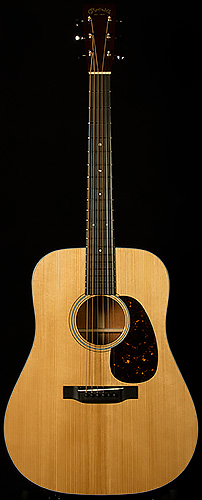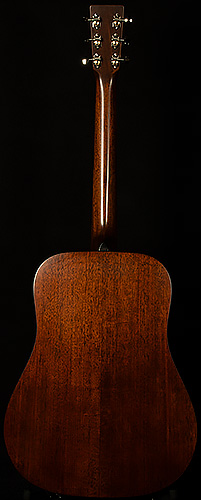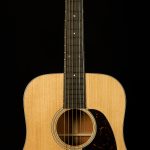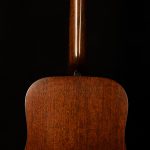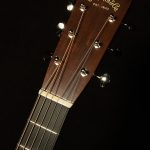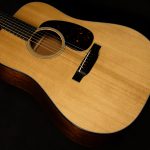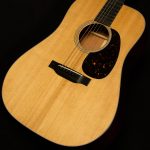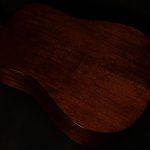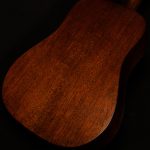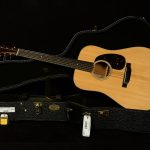Martin Guitars D-18 Authentic 1937 VTS
Dread Not!
Can you imagine a world without dreadnought acoustic guitars? It seems like an impossible exercise given the way the Martin dreadnought has become interwoven with the musicological fabric of America. But until Christian Fredericks Martin built the first large-bodied acoustic with a spruce top and mahogany back and sides in 1916, there was no such thing as a dreadnought! Named for the largest, most fearsome battleship in the world at the time (the H.M.S. Dreadnought), the original examples were commissioned by a publishing house in Boston called the Oliver Ditson Company, and they were marketed as Ditsons with non-Martin serial numbers in New York and Boston only.
Once C.F. Martin realized that this whole dreadnought thing was going to take off, he started stamping his own name on the headstock of a guitar called the D-1 in 1931. The D-1 quickly morphed into the D-18, and apart from a few small tweaks to the bracing and the addition of a 14-fret neck, it has remained mostly unchanged ever since. Why fix something so decidedly unbroken? After all, the D-18 has long been a staple at open mics, bluegrass jams, rock shows, and recording studios for a reason: it has a timeless sound that seems to resonate with the heartstrings of any musician who picks one up.
Simple Doesn’t Mean Easy
Part of this has to do with the D-18’s elegant simplicity. The D-18 formula consists of only a few ingredients: a spruce top, mahogany back and sides, and incredible craftsmanship. Because they still follow this same recipe, modern D-18s don’t really sound much different out of the box than old D-18s did when they were fresh from the factory (sure, they might have had choicer cuts of wood in the ‘30s, but at the end of the day, a D-18 still sounds like a D-18). Other than the guy who invented Nutella (Pietro Ferrero, in case you were curious), can you think of anyone who designed something so perfect the first time around that it didn’t need any improvement?
A Serious Pedigree
The D-18’s enduring appeal is a testament to the perfection of the original design, and the Wildwood team believes that the 1937 Authentic version of this American classic continues the proud tradition of excellence established by its vintage brethren. It marries vintage flavor to modern workhorse capability in a truly beautiful way. This modern D-18 comes with quite a pedigree, so let’s take a closer look and see why its sweet sounds continue to delight us!
The Main Ingredients
Mahogany and spruce are the backbone of the D-18, and for good reason: they go together like macaroni and cheese, and the tones they produce together are utterly delectable. Why? Well, opposites attract! By itself, spruce is bright and crisp and clear, while mahogany is warm and round. When you put them together, you get a guitar that lands right in the middle of the tonal spectrum.
Because of this tonewood pairing, the D-18 sounds clear, and it cuts through a mix like a wooden broadsword, but it never sounds tinny or harsh. It has an undeniable warmth and woodiness in the midrange and an earthiness to the bass response, but it never sounds flubby or muddy. It’s articulate, yet round. It’s touch-sensitive, but it always remains balanced, and though it sounds full and rich, it’s never overpowering. It’s proof that, In the world of guitars (and most things in life, really), when opposites meet in the middle, beautiful things happen.
No Weaknesses
Hopefully by now, you have realized two things: that the Wildwood staff has a deep and abiding love for the D-18, and that it is a simple, elegant guitar with no weaknesses. It can cut through a mix when used for leads or provide a solid rhythmic foundation when used for chordal work. It can project well enough to excel in live situations, but recording engineers also love it for its sculpted frequency response. It’s responsive enough to fingerpick on, but it can also handle aggressive strumming with aplomb. Furthermore, its clear, balanced voice sounds at home in almost any musical context. We are proud to present an instrument that continues Martin’s storied dreadnought tradition, and we know the D-18’s timeless sound and superior playability will inspire you throughout all your acoustic adventures.
Specifications:
| Brand | Martin Guitars |
|---|
| Model | D-18 Authentic 1937 VTS |
|---|---|
| Type | Authentic D-14 Fret |
| Top Finish | Vintage Gloss |
| Top Wood | Solid Adirondack Spruce with VTS |
| Bracing | 5/16" Scalloped Adirondack Spruce with VTS, Forward-Shifted X-Brace |
| Back & Sides Wood | Solid Mahogany |
| Back & Sides Finish | Vintage Gloss |
| Neck Wood | Mahogany |
| Neck Finish | Vintage Gloss |
| Neck Joint | Dovetail attached with Hide Glue |
| Neck Shape | Authentic 1937 with Standard Taper |
| Neck Dimensions | .840 1st - 1.090 9th |
| Fretboard Material | Ebony |
| Fingerboard Inlays | Abalone Old Style 18 |
| Scale Length | 25.4" |
| Width at Nut | 1 3/4" |
| Nut Material | Bone |
| Binding | Tortoise Pattern |
| Rosette | Old-Style 18 Multi-Stripe |
| Tuners | Waverly Nickel Open-Back with Butterbean Knobs |
| Bridge | Ebony Authentic Belly - Glue in Long Saddle |
| Bridge Spacing | 2 1/4'' |
| Saddle | 16" Radius/Bone |
| Pickguard | Tortoise Pattern |
| Case | Harptone Black 5-Ply Hardshell |
Why Order from Wildwood Guitars?
An instrument from Wildwood isn't just an ordinary guitar. It's your guitar. Each and every instrument we sell includes a full, point by point setup, an exhaustive evaluation, and expert shipping procedures, with first class, industry leading standards from start to finish. Why? Because you deserve it.Click Here to learn more about what makes a Wildwood instrument so special...



